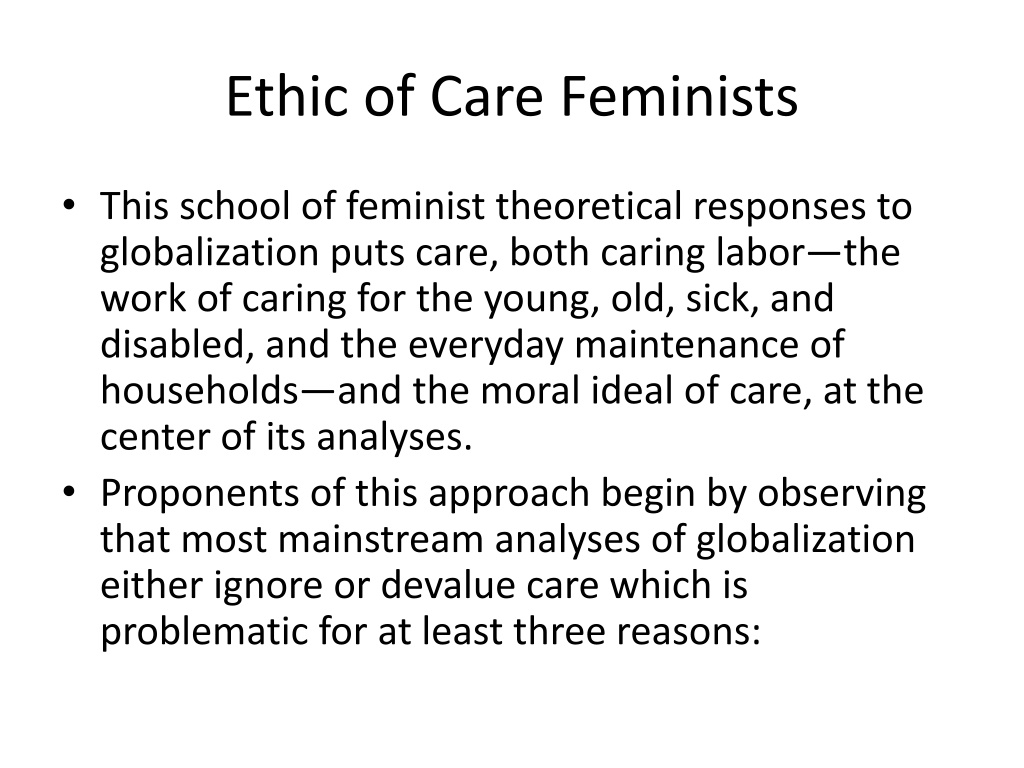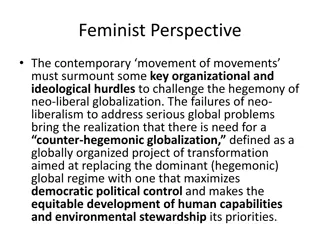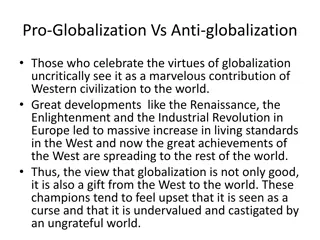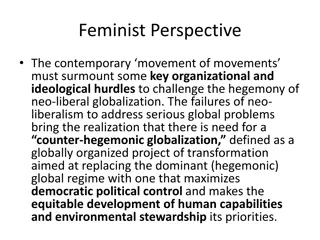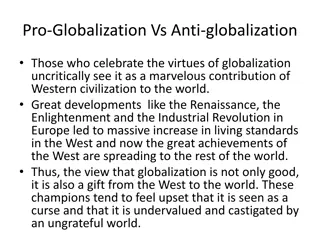Ethics of Care Feminists: Responding to Globalization
Ethic of Care Feminists prioritize caring labor and the moral ideal of care in response to globalization, challenging neoliberal assumptions and advocating for relational values as the basis of just globalization, promoting a global duty to care.
Download Presentation

Please find below an Image/Link to download the presentation.
The content on the website is provided AS IS for your information and personal use only. It may not be sold, licensed, or shared on other websites without obtaining consent from the author. Download presentation by click this link. If you encounter any issues during the download, it is possible that the publisher has removed the file from their server.
E N D
Presentation Transcript
Ethic of Care Feminists This school of feminist theoretical responses to globalization puts care, both caring labor the work of caring for the young, old, sick, and disabled, and the everyday maintenance of households and the moral ideal of care, at the center of its analyses. Proponents of this approach begin by observing that most mainstream analyses of globalization either ignore or devalue care which is problematic for at least three reasons:
Ignoring or Devaluing Care Problematic for Three Reasons Care work, which is done almost exclusively by women, has been profoundly influenced by globalization; ii. The values and work associated with care are both undervalued and insufficiently supported, and this contributes to gender, racial, and economic inequality, both within countries and between the global North and the global South; and iii. Any viable alternative to neoliberal globalization must prioritize the moral ideal of care. Thus, ethics of care approaches to globalization have both theoretical and practical dimensions. i.
Assumptions of Neoliberalism Challenged In their view, neoliberalism presupposes a problematic notion of the self, which posits individuals as atomistic, independent, and self-interested, and an inaccurate social ontology, which suggests that human relationships are formed by choice rather than necessity or dependency. These assumptions lead neoliberalism to prioritize economic growth, efficiency, and profit making over other values, such as equality, human rights, and care. Ethics of care feminists reject these assumptions. In their view, human beings are fundamentally relational and interdependent; individuals are defined, indeed constituted, by their caring relationships.
Relational Values: The Basis of Just Forms of Globalization All persons experience long periods during which their lives literally depend on the care of others, and everyone needs some degree of care in order flourish. Thus, vulnerability, dependency, and need should be understood not as deficits or limitations, but rather as essential human qualities requiring an adequate political response. Ethics of care feminists contend that relational values, including care, should form the basis of more just forms of globalization. Because a global care ethics begins with a relational ontology, it requires global political leaders to develop social and economic policies that aim to meet human needs and reduce suffering rather than to expand markets and increase economic competition (Hankivsky 2006).
Global Duty to Care Held endorses a similar view. According to her, an ethic of care requires leaders to foster a global economy that is capable of meeting universal human needs (Held 2004, 2007). Similarly, Miller advocates a global duty to care, which requires individuals to take responsibility for their role in contributing to global oppression, and obligates leaders to advocate for institutions that embody the moral value of care (Miller 2006). Concretely, feminist theorists who favor an ethics of care approach highlight the role of care work in the global economy and put forth recommendations for reevaluating it.
The Global Distribution of Care Work Robinson develops a relational moral ontology that sheds lights on the features of globalization that are usually invisible: the global distribution of care work and the corresponding patterns of gender and racial inequality. He highlights on the under-provision of public resources for care work in both developed and developing countries; and the ways in which unpaid or low-paid care work sustains cycles of exploitation and inequality on a global scale (Robinson 2006a, 2006b). Similarly, Held advocates for increased state support of various forms of care work and for policies designed to meet people s needs in caring ways (Held 2004, 2007).
Transnational Feminism In its broadest sense, transnational feminism maintains that globalization has created the conditions for feminist solidarity across national borders. On the one hand, globalization has enabled transnational processes that generate injustices for women in multiple geographical locations, such as the global assembly line. Yet on the other, the technologies associated with globalization have created new political spaces that enable feminist political resistance. Thus, transnational feminists incorporate the critical insights of postcolonial, Third World and ethics of care feminists into a positive vision of transnational feminist solidarity.
Transnational Feminism Vs Global Feminism However, transnational feminism differs from global feminism in at least three significant respects: First, transnational feminism is sensitive to differences among women. Global feminists argue that patriarchy is universal; women across the globe have a common experience of gender oppression. They promote the recognition of a global sisterhood based on these shared experiences, which transcends differences in race, class, sexuality, and national boundaries. This solidarity is thought to provide a unified front against global patriarchy.
Transnational Feminism Vs Global Feminism (Contd.) Transnational feminists also advocate for solidarity across national boundaries. However, their approach emphasizes the methodological commitments discussed above, specifically intersectionality, sensitivity to concrete specificity, and self- reflexivity. Transnational feminists are careful to point out that although globalizing processes affect everyone, they affect different women very differently, based on their geographical and social locations. They are also quick to acknowledge that many aspects of globalization may benefit some women while unduly burdening many others. Second, transnational feminist solidarity is political in nature. Whereas global feminists advocate a form of social solidarity defined on the basis of characteristics shared by all women, such as a common gender identity or experience of patriarchal oppression, transnational feminist solidarity is grounded in the political commitments of individuals, such as the commitment to challenge injustice or oppression.
Transnational Feminist Solidarity Based on Shared Political Commitments Because transnational feminist solidarity is based on shared political commitments rather than a common identity or uniform set of experiences, advantaged individuals, including those who have benefited from injustice, can join in solidarity with those who have experienced injustice or oppression directly (Ferguson 2009, Scholz 2008). The emphasis on shared political commitments also enables feminists to resist oppressive conditions that manifest differently in different geographical locations but are nonetheless prevalent in many countries, such as racialized violence against women (Khader 2019, 44 48). Third, transnational feminists focus on specific globalizing processes, such as the growth of offshore manufacturing, rather than a theorized global patriarchy, and often take existing transnational feminist collectives as a model for their theoretical accounts of solidarity.
